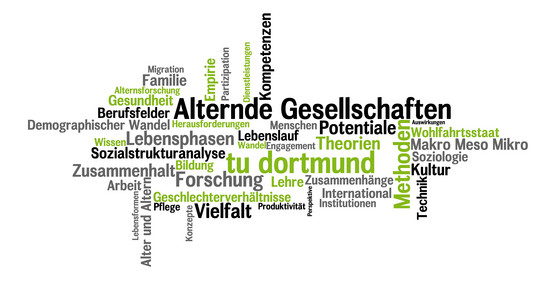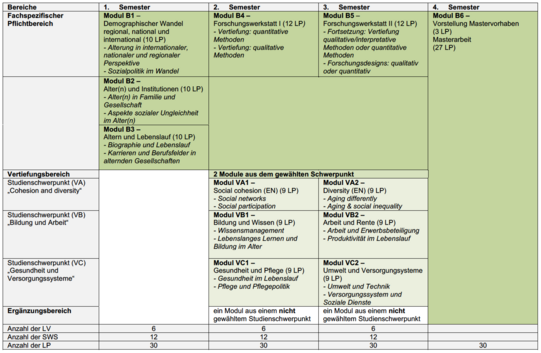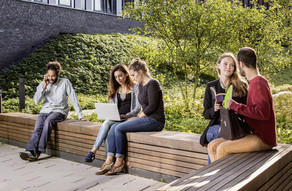Welcome to the homepage “Master Ageing Societies”!
Online information event on the Master's degree program in Ageing Societies
Are you interested in topics such as demographic change, lifelong learning, social participation, diversity and housing and lifestyles in old age?
Would you like to learn more about age and ageing from a sociological and psychological perspective and about quantitative and qualitative social research? Then your studies after your Bachelor's degree are not over yet and the Master's degree program in Ageing Societies at TU Dortmund University is just right for you!
At the information event on Wednesday, May 22, 2024 at 5 p.m., we will offer an insight into the Master's degree program in Ageing Societies, providing information about the course content, career prospects after graduation, the start of the semester and other information. You will also have the opportunity to ask your own questions.
We cordially invite you to our Zoom meeting:
https://tu-dortmund.zoom.us/j/92155796254?pwd=WmZpN0tZa1VUTEoxNmI5T2pKeFdhZz09
You can find more information here on our Website or send an email to alternde.gesellschaftentu-dortmundde.

The Master's program understands demographic ageing, related social inequalities and societal transformation processes as one of the most important individual, institutional and general societal challenges of our time.
The overarching objective is to provide profound knowledge about individual and societal ageing as well as methodological competence in the field of empirical social research. This will enable students to investigate existing and future challenges associated with an ageing society in both research and practice independently. The Master's program is led by Prof. Dr. Martina Brandt (Chair of Social Structure and Sociology of Ageing Societies) and Prof. Dr. Monika Reichert (Chair of Social Gerontology and Life Course Research).
You can also find a brief overview of the program on our flyer (only in German).
If you have any further questions, please contact us by mail.
On our homepage you will find the following content about the Master's program:
Students' feedback on the study program
»In my studies, my special interest lies on the social changes and political challenges that arise with demographic ageing«
»I can bring in my professional experience and my personal thematic focus 'Queer Ageing' in an enriching way. This is due to the great openness and the possibilities to contribute to the content in the seminars as well as the diversity of the students«
»I find the study program interesting because of its broad selection of focus areas, but also the scientific, empirical orientation is particularly good here«
»In the study program there is a great exchange with students and lecturers«
»In the Master’s program, I am especially interested in aspects related to the topics of care and social injustice«
Master's curriculum

The Master's program “Ageing Societies” is structured in a regular study period with 120 credit points (CP).
Compulsory curricullum (54 CP):
- Acquiring knowledge and skills about age and ageing from a sociological and psychological perspective
- In-depth methodological expertise of quantitative and qualitative social research
Specialization area (18 CP):
- Choice between three specializations (2 modules each):
- Module VA - Cohesion and diversity [engl.] (including topics such as: diversity in old age, social participation/networks, transnationalization and globalization, gender).
- Module VB - Education and work (with topics such as: Knowledge transfer, learning in old age, productivity, digitalization of the working world).
- Module VC - Health and care (including topics such as: new technologies, forms of living and lifestyles in old age, care systems, climate change)
Complementary curriculum (18 CP):
- Choice of two modules which have not been chosen in the specialization area
- Given individual interest and motivation, possible to additionally study a second specialization
Master thesis (30 CP):
- Presentation of the Master project
- Master thesis
Career prospects after graduation

Graduates of the Master's program have become familiar with a wide variety of topics in the context of demographic ageing and have comprehensive knowledge of both qualitative and quantitative empirical social research methods. In addition they have acquired important competencies by combining research-related, theoretical, and application-oriented content.
This enables our graduates to independently conduct research projects in basic research as well as applied social and ageing research.The Master’s program offers the opportunity to develop an individual study profile that qualifies students for challenging tasks and leading functions. This applies, for example, to the following professional fields:
- Scientific (ageing) research and teaching at universities, other institutions of higher education, non-university research institutions
- Management, consulting, planning in welfare organizations/associations/private institutions whose target groups are ageing and older people (e.g. in the field of civic engagement, nursing care)
- Management, consulting, planning in public authorities at EU, federal, state and local level in the field of planning and policy for the elderly
- Age management in companies and administrations in the field of (company) personnel policy
- Teaching, management, planning in institutions of education and further training
- Consulting and planning in the field of tourism and consumer goods industry
Further information
Enrollment in the program is only possible in the winter term. Students must have completed at least 6 semesters of a Bachelor's, Master's or Diploma program in a social or behavioral science discipline with an overall grade of at least "good". Furthermore they must have sufficient knowledge in social scientific research methods (modules in empirical research methods and statistics with at least 10 credit points). Students who do not have sufficient knowledge in methods must make up for this within the first Master's term.
The following links will provide you with further information on how to enroll in the Master’s study program:
The departmental student council of the Master "Ageing Societies" consists of volunteer members who represent students needs. The departmental student council can be contacted regarding problems, ideas or questions about the study program and organizes activities and excursions. Furthermore, it is represented in various committees.
Further questions about the study program can also be addressed to the departmental student council by mail (fsalternpost.tu-dortmundde)
The departmental student council is also on Instagram.
Requests to the examination board for subsequent approval of credit points, external examiners or other exceptional cases requiring approval as regulated in the examination regulations should be addressed in writing to the examination board and sent to the secretary's office or placed in the mailbox. After reviewing the request, the examination board will forward the decision directly to the examination office, which will inform you of the final result.
Tasks
- Management and coordination of the study program
- Compliance with the examination regulations
- Examination of cases of doubt, individual and hardship cases
- Crediting of academic achievements
Members
Professors:
- Prof. Dr. Monika Reichert (chairperson of the examination board)
- Prof. Dr. Martina Brandt
Research associates:
- Markus Klingel
- Nehle Penning (deputy)
Student members:
- Felix Fankhänel
- Lena Kukowka (deputy)
External member:
Prof. Dr. Christoph Strünck
- Examination regulations 2020
- Modul manual 2016
- Examination regulations 2011
- Modul manual 2011
- Certificate of active participation
- Overview of courses for credit points in the area of methods and statistics
- Form for credit points to be credited in the are of methods
Further helpful documents can be found on the homepage of the Chair of Social Structure and Sociology of Ageing Societies.
TU Dortmund
Department Social Sciences
Chair for Social Structure and Sociology of Ageing Societies
Secretary's office: Jana Dreypelcher
Emil-Figge-Str. 50
44227 Dortmund
E-Mail: alternde.gesellschaftentu-dortmundde








